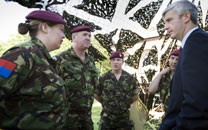Forces medical records system ready to roll out
- 3 August 2007
 |
Following successful pilots, the Defence Medical Information Capability Programme (DMICP) is due to be deployed progressively around military bases in the UK and abroad by August next year.
The DMICP, developed by LogicaCMG, will allow instant access to military personnel’s health history from any enabled system, in a field hospital, on a ship, even on a battlefield, replacing the current mixture of locally stored electronic records and paper-based records.
First announced in 2004, the £80m 10-year project was awarded to LogicaCMG in 2006 and pilots began at the beginning of this year.
Dr Richard Williams, DMICP programme director, told E-Health Insider: “This system is bringing the healthcare of military personnel into the 21st century by ensuring that soldiers have detailed care records available at all times, thus helping to guarantee that they receive the best possible healthcare they can expect from the armed forces.”
The system itself has been jointly developed with EMIS, using the EMIS PCS system – which incorporates both healthcare and dentistry into one system for use across all military bases.
Lieutenant Colonel Jonathan Cox, a GP and clinical policy officer for the Army Primary Healthcare Service, told E-Health Insider: “This system is pivotal to ensuring that military personnel are offered the best healthcare possible. It is essential that the military is seen to be offering the same standard of care as the NHS, and by switching to this system, the Ministry of Defence is making that promise a lot easier to offer.”
The Ministry of Defence formally launched the system yesterday, following a successful trial at the Colchester Medical Reception Station, which acted as a pathfinder site to de-bug the system.
The centre provides defence medical services for 33,000 soldiers; receptionists at the site said it had made administration much easier for them.
“The new DMICP system is much more user-friendly, especially as it is more Windows-based as opposed to our old DOS-based system. The system offers us full standard menus, which make data a lot easier to open and save. GPs here also find it useful, with the ability to cross-reference material using resources at the click of a button,” said Gareth Beel, a receptionist at Colchester.
Colonel Mike Manson has been responsible for the project since its conception and told EHI that the launch marks a turning point in the healthcare of military personnel.
“After years of work, with requirements capture and risk reductions, we are finally able to launch a system that is fully functional and will enable working medical centres in army bases in the UK and abroad to record real-time information about the patients anywhere, and at any time.
“The highest level benefit of DMICP is that it will increase the abilities of armed forces personnel, ensuring that they are fit for task at any given time and location, so that they can give urgent medical care immediately without fear of doing anything potentially life-threatening. It offers the optimum care pathway so recruits are healed as fast as physically possible.”
LogicaCMG has built the system so that records are stored centrally on an integrated health record server at their headquarters.
DMICP combines both health and dental detail within a single MoD personnel health record and includes specific enhancements required by the MoD. Authorised clinicians and dentists will be able to access elements of patients’ medical records anywhere and anytime.
Lt Col Cox outlined the benefits for defence medical personnel: “Firstly, the system is GP2GP compatible, so it will allow patient healthcare records to be networked to the system without posting envelopes and with no loss of contact. This is essential in the military, with people moving around and moving home every two to three years. It also provides lots of extra useful reference material, available on the desktop with immediate access, so no need to fiddle around on the internet searching.”
He added that senior staff could also use the system to keep up to date with reporting and additional functionality that was not previously available to them.
“Every night, LogicaCMG transfers patient data to a central data central warehouse which is completely anonymised and can be accessed by authorised senior officials. Managers or superiors can then get any information they want from it, still anonymised, and analyse it to find current risks or trends we should be aware of.”
The reporting facility will be especially useful when MoD debates are being held in parliament, he added.
“The system will make it much easier to answer questions quickly and accurately and completely data corruption free. The information presented is up to date and gives all involved an idea of the medical issues defence personnel face at present.”
LogicaCMG says the new system is now fully fit for rollout and will enable information to be shared across all functional areas to enable effective medical services, providing timely and efficient access to clinical records and medical knowledge.
Defence minister Derek Twigg, launched the system, and said: “The new system being launched is all about improving the care and treatment of military personnel. Doctors, pharmacists, nurses and other health professionals will now benefit from access to one central database, providing the most up-to-date information on their patients- it will not matter if they are in Birmingham or Basra.”
After 2008, a version of the system will be available in field hospitals, on board ships and on the battlefield via laptop and other portable equipment under development. This will mean instant access to casualties’ medical records to aid diagnosis and improve and speed up treatment.
The system will also allow casualties to be issued with a chip loaded with their health records as a back-up until they reach a military medical or NHS facility.
Lieutenant General Robert Baxter, deputy chief of defence staff in health, said: “The ability to access patient records anywhere, anytime is an invaluable asset and the assurance of a single record for each patient will give medical staff greater confidence that when treating patients they are looking at a definitive record.
“The system will allow staff to work more efficiently, spend more of their time caring for patients and utilise medical resources more effectively. We will quickly see the powerful impact that DMICP will have on both DMS staff and patients.”
From 2010, the system will be connected to the NHS National Programme for IT, simplifying and improving the processes by which service personnel gain access to treatment in NHS hospitals.
Col Manson said: “By 2010 we will be interface to NPfIT in three key components. We will be able to provide a summary care record to the spine provided the individual is happy to share their records, so that any hospital can access this with legitimate rights.
“We are already using GP2GP and will further this when it is fully available so that NHS medical records of new recruits can be imported directly into the Defence Medical Services, and records can be exported back to civilian GPs on retirement and we will also begin to use Choose and Book, so that we can allocate hospitals for recruits to go – to if we cannot treat them ourselves – at the click of a button.”
Ed Jones, managing director of LogicaCMG’s Space and Defence Division told EHI:
“The close partnership between the Defence Medical Services team and LogicaCMG brings together a powerful combination of skills from within the public and private sectors, which has been essential to the programme’s delivery on time and to budget.”




